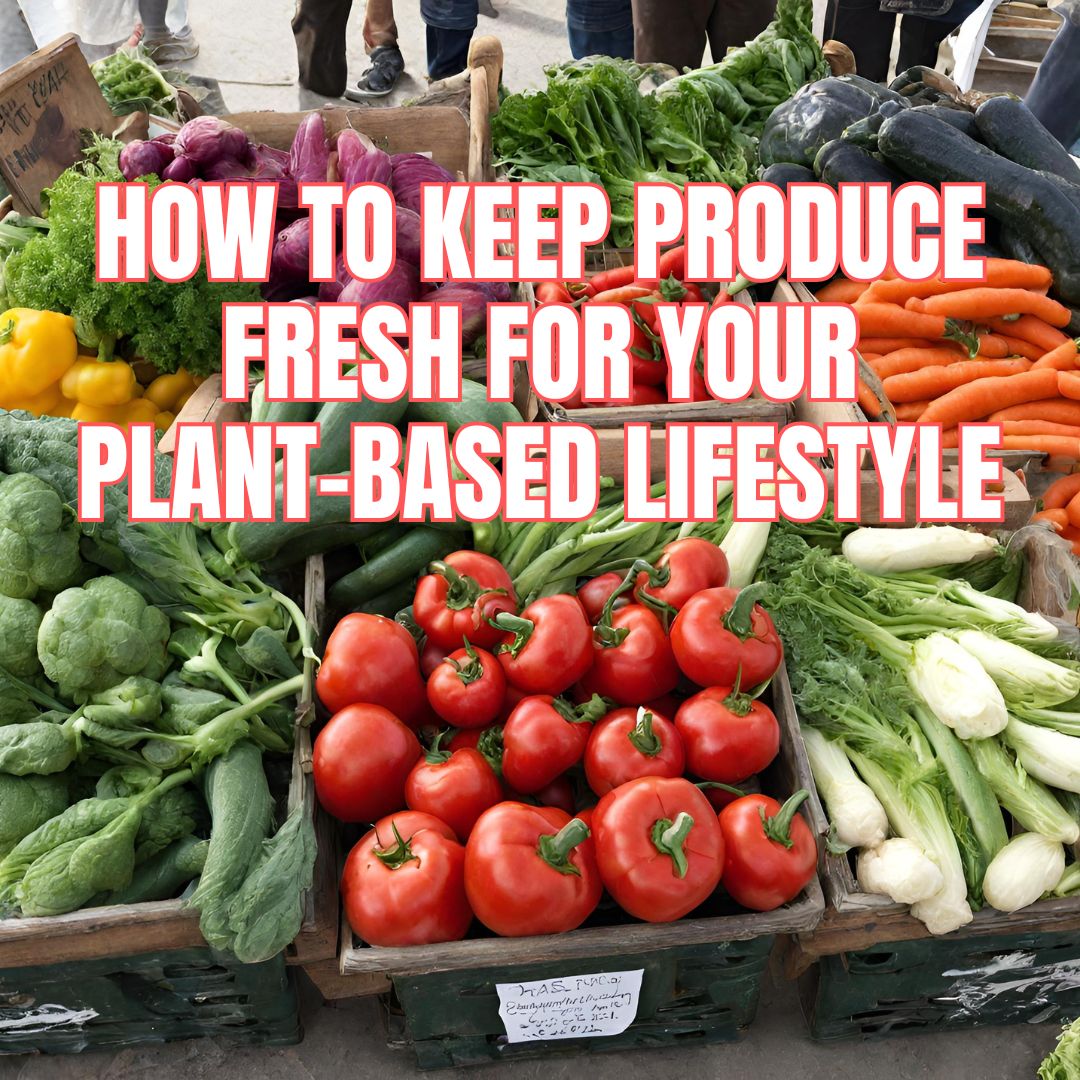Learning how to keep produce fresh is crucial for any plant-based kitchen, both for your health and to minimize food waste. But it’s not just about reducing waste; mastering produce preservation also means fewer trips to the grocery store and more money staying in your pocket. With spring bringing an abundance of fresh, vibrant fruits and vegetables, now is the perfect time to refine your storage habits. While perfect storage isn’t always intuitive, this guide offers practical solutions to extend the life of your fruits and vegetables, keeping them at their peak for your whole foods recipes.
If you’re new to plant-based living, make sure to check out our PLANT-BASED STAPLES for a comprehensive list of must-have ingredients to get started!
The Importance of Keeping Produce Fresh
Before we get into storage tips, let’s highlight why keeping produce fresh is so essential. Fruits and vegetables are rich in nutrients, fiber, and antioxidants, forming the foundation of a healthy lifestyle. The fresher they are, the more vibrant their flavors and the higher their nutrient content, making them a key component of any whole foods plant-based diet. By maintaining freshness, you’ll ensure that your meals stay both delicious and packed with the best possible nutrition.
Sourcing Top-Quality Produce
Grocery Stores
Choosing the right grocery store is essential for getting the freshest produce. Some stores consistently stock high-quality fruits and vegetables, while others may have a quicker turnover, leading to less-than-ideal options. If you’re ordering groceries online, be cautious—some stores lack the quality control needed for selecting the best produce. While convenient, delivery orders often rely on employees who may not pick the ripest or freshest items. If possible, shop in person to select your own produce.
Warehouse stores can also be a fantastic source of high-quality fruits and vegetables, often offering bulk options that are great for meal prepping or large households. Many of these stores receive frequent shipments, ensuring their produce is fresh, but be mindful of portion sizes to avoid waste.
Farmers Markets
Shopping at farmers markets ensures you’re getting the freshest, seasonal produce, sometimes even picked that very morning. Plus, talking directly to local farmers can give you excellent storage tips and insight into the best ways to keep your fruits and vegetables fresh longer.
Community Supported Agriculture (CSA)
A CSA membership provides locally grown, fresh produce directly from farmers, often harvested just days—or even hours—before pickup or delivery. This not only helps keep produce fresh but also supports sustainable agriculture and local economies. Many CSA programs begin in late spring or early summer, with pro-rated buy-ins available throughout the season. Some even offer late fall and winter shares, particularly in warmer climates or for storage crops like root vegetables and squash. To find a CSA near you, check out LOCALHARVEST.ORG.
General Storage Tips to Keep Produce Fresh
Proper storage can make all the difference in extending the life of your fruits and vegetables. By understanding which items need refrigeration, which should be kept at room temperature, and how to prevent premature spoilage, you can maximize freshness and reduce waste. Keep these simple guidelines in mind:
- Refrigerate or store in a cool, dark place when appropriate.
- Avoid ethylene gas exposure that expedites food over-ripening by keeping certain fruits and vegetables separate.
- Wash before eating, not before storing to prolong shelf life.
- Use original packaging or reusable containers to maintain freshness.
- Check regularly for spoiling items to prevent waste.
- Compost when necessary to reduce food waste sustainably.
Quick-Glance Storage Cheat Sheet
Use this easy reference to ensure your produce stays fresh longer:
| Produce | Storage Method |
|---|---|
| Apples | Refrigerate in crisper drawer, away from ethylene-producing fruits |
| Asparagus | Trim ends, store upright in water, cover with plastic |
| Avocados | Ripen at room temp, then refrigerate |
| Bananas | Store at room temp until speckled; refrigerate to extend lifespan |
| Berries | Keep unwashed in the fridge; rinse before eating |
| Broccoli | Store in a plastic bag in the crisper drawer |
| Brussels Sprouts | Store in a plastic bag in the crisper drawer |
| Cabbage | Store whole in the crisper; wrap cut portions tightly |
| Carrots | Wrap in foil or store submerged in water |
| Cauliflower | Store whole in the crisper; wrap cut portions tightly |
| Celery | Wrap in foil or store submerged in water |
| Cherries | Keep cold; consume quickly for best flavor |
| Citrus (Oranges, Lemons, Limes, Grapefruit) | Store in a cool spot |
| Corn | Store unhusked in plastic in the fridge |
| Garlic | Keep in a dry, well-ventilated space |
| Grapes | Keep unwashed in the fridge; rinse before eating |
| Herbs | Store dry in a bag or upright in water |
| Leafy Greens | Store in a bag with a paper towel to absorb moisture |
| Mangoes | Ripen at room temp, then refrigerate |
| Melons | Store whole at room temp; refrigerate after cutting |
| Nectarines | Store in a cool, dry place |
| Onions | Store in a dark, dry spot away from potatoes |
| Pears | Refrigerate once ripe |
| Peaches | Store in a cool, dry place |
| Pineapple | Ripen at room temp, then refrigerate |
| Plums | Keep cold; consume quickly for best flavor |
| Pomegranates | Store whole at room temp; refrigerate seeds |
| Potatoes | Keep in a cool, dark place away from onions |
| Summer Squash (Zucchini & Yellow Squash) | Store in a plastic bag in the crisper |
| Tomatoes | Store at room temp, away from direct sunlight |
| Winter Squash (Acorn, Butternut, Spaghetti) | Store uncut at room temp |
Final Thoughts on Keeping Produce Fresh
By sourcing high-quality produce and using smart storage techniques, you’ll keep produce fresh for longer, allowing you to enjoy flavorful, nutrient-rich meals every day. For more information on keeping your product fresh, check out this SELF magazine article HERE’S HOW TO STORE PRETTY MUCH ANY KIND OF PRODUCE. With just a little planning, you can reduce food waste, save money, and make the most of your plant-based lifestyle. Whether you’re shopping at the grocery store, picking up a CSA share, or grabbing fresh finds from the farmers market, proper storage ensures your fruits and vegetables stay at their peak. Implement these simple tips, and you’ll always have fresh ingredients ready to fuel your healthy, plant-based kitchen!






